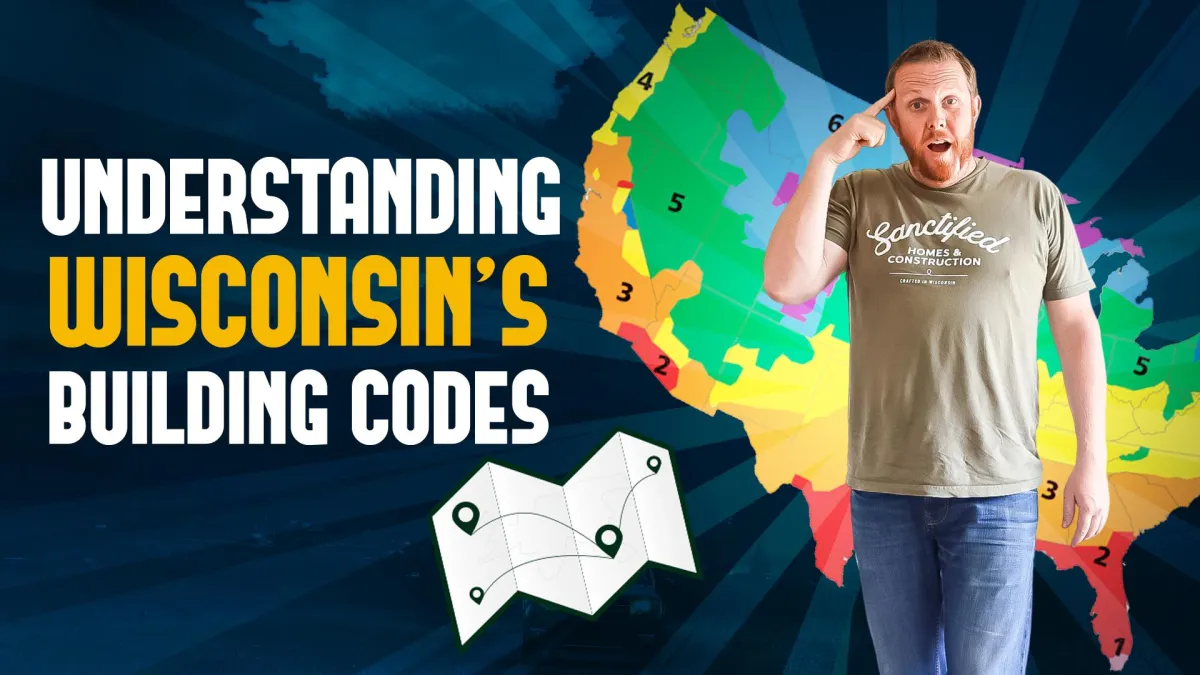
Understanding Wisconsin’s Building Codes
Hey everyone, it's TJ from Sanctified Homes and Construction. Today, we're diving deep into the 2021 IECC (International Energy Conservation Code) building codes and their implications for Wisconsin. While the IECC aims to push energy conservation forward, it's crucial to note that not all Wisconsin has adopted these standards. This discussion is especially pertinent for those considering building or remodeling their homes in Wisconsin.
The Current State of Wisconsin Building Codes
Wisconsin's stance on building codes, particularly regarding energy conservation, is a topic of much debate. Recent legislative decisions have opted to maintain current standards rather than align with the evolving IECC codes. This decision has significant implications for homeowners and builders alike, as it places Wisconsin behind many other states in terms of energy efficiency and building quality.
Insulation Standards: A Case Study
To illustrate the gap between Wisconsin and the IECC standards, let's focus on insulation—a critical component of any building's energy efficiency. The IECC categorizes the United States into different climate zones, each with recommended insulation levels. Wisconsin falls into Building Zone 6, which, according to the 2021 IECC, should have attic insulation levels at an R-value of 60. However, Wisconsin's current standards allow for as low as R-38 in some cases, significantly below the IECC's recommendations.
The Importance of R-Values
R-value measures a material's resistance to heat flow, with higher numbers indicating better insulation. The difference between R-38 and R-60 is not just a matter of numbers; it represents a significant gap in energy efficiency, potentially leading to higher heating costs and less comfortable living environments.
Wall Insulation: Another Concern
The disparity extends beyond attics to wall insulation. The 2021 IECC recommends an R-20 plus R-5 insulation for walls in Climate Zone 6, which translates to R-20 insulation inside the walls plus R-5 continuous insulation on the exterior. This standard aims to minimize thermal bridging and enhance overall energy efficiency. In contrast, Wisconsin's standards are currently at R-19 for walls, lacking the additional exterior insulation requirement.
The Call for Higher Standards
This comparison between Wisconsin's building codes and the IECC's recommendations highlights a broader issue: the need for higher standards in construction practices. As builders and homeowners, we must advocate for codes that ensure our homes are not only safe and durable but also energy-efficient and sustainable.
The Role of Homeowners and Builders
Homeowners and builders must understand these standards and push for improvements. Engaging with local legislators, participating in public forums, and staying informed about building science are all ways to advocate for change. Additionally, choosing to build or remodel to higher standards, even when not legally required, can lead to long-term savings and a more sustainable future.
Conclusion
Wisconsin's building codes, particularly regarding insulation and energy efficiency, need to catch up to the recommendations set forth by the 2021 IECC. This gap has implications for energy consumption, environmental impact, and the overall quality of new and remodeled homes. As we look to the future, it's imperative that we, as a community of builders and homeowners, push for standards that reflect the best practices in energy conservation and building technology. For more insights into building practices and standards, visit Wisconsin Home Build and Blessed to Build. Together, let's not settle for the minimum—let's strive to raise the standard.

Home Building Checklist
We understand that the process of building comes with a lot of decision-making. So we created the Home Building Checklist to guide your decision-making process, and it's yours for free here!

The Blessed to Build Foundation is a 501(c)3 Non Profit providing education & resources to help homeowners and home builders make informed choices about building homes that last.
Dane County, Wisconsin
Hire a Builder
If you are looking to build a new home in the following cities, connect with Sanctified Homes & Construction to start the conversation.
Copyright Blessed to Build Foundation, Inc. 501(c)3

